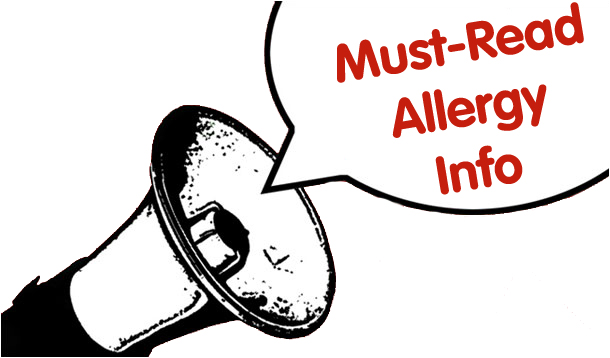
It’s something you might not want to think about, because—let's face it—it's probably your worst nightmare: what if your child comes into contact with his or her allergy trigger and starts to have a severe allergic reaction? It’s the worst-case scenario if you have a kid with a severe allergy, and it’s natural to want to avoid the very thought. But, of course, you need to do the exact opposite. You need to give it detailed thought, and you need to know EXACTLY what to do if such a situation were to arise.
In a severe allergic emergency, every second counts. But first, you need to be able to recognize an allergic reaction when it's happening.
Here are the key symptoms that herald a severe allergic reaction. A reaction can include just a few, or all of these:
Click for more details on severe and anaphylactic reactions, and the things you need to know about them.
Acting quickly is critical. And here’s one of my most important take-home messages: do not hesitate to use your EpiPen Auto-Injector. You don’t have to be positive that what you’re witnessing is a true severe allergic reaction. You don’t need to wait it out, to see if your child’s symptoms worsen. Use your child’s EpiPen at the first sign of a severe allergic reaction. The risks associated with hesitating to use an EpiPen are greater than the risks associated with administering an EpiPen unnecessarily. Hesitation can be life-threatening.
Here are the steps you need to take:
1. Inject epinephrine at the first sign of a severe allergic reaction. This is the treatment of choice for severe allergic reactions. It helps reverse the symptoms of an allergy.
2. Call 911.
3. Help your child to lie down or sit down in the most comfortable position for their breathing.
4. Stay calm.
5. Listen and watch to make sure your child can still breathe and that their airway is staying open.
6. If an insect stinger is present in the skin, try to remove it by brushing at it gently. Do not pinch it—that may cause the stinger to release more venom.
7. If you have CPR training (which I highly recommend—especially if you have a kid with a severe allergy), go through the steps and give it as needed. If your child also has asthma, you can give them their inhaler. Do this only after you have administered the EpiPen.
There’s a good chance you’ve never given anyone an injection, but this is definitely something you can do.
Look at the EpiPen.ca website for step-by-step instructions, with pictures, or watch the video. Even better? Get an EpiPen training device and give it a go. As many times as you need to, until you get comfortable. It really is very easy. Even when you do get the hang of it, you should consider practicing from time to time (there's every likelihood that you won't have to actually use it very often.)
Remember, using an EpiPen does not replace seeing a doctor or going to the hospital. That's because the effects of epinephrine can wear off. Sometimes a second reaction will occur, and that can happen several hours after the initial reaction. If symptoms return before receiving medical attention, additional injections may be needed. Also, even after you get medical help, it's important to stay close to a place where you can easily call 911 for the next 48 hours.
It will be the rare occasion indeed, that you'll have to actually use your EpiPen. Which means: it may expire before you use it. It's important to have a system in place to remind you when your EpiPen is about to expire. You can register for the Expiration Reminder Service on EpiPen.ca.
Naturally, you're going to do everything in your power to prevent this kind of emergency from happening. But...if it does, you'll be prepared.
You've got this.
 Severe allergies are on the rise in Canada.
Severe allergies are on the rise in Canada.
This is proudly sponsored by EpiPen®.
EpiPen.ca
The opinions expressed in this post are the opinions of the individual author and may not reflect the opinions of Pfizer Canada, the Canadian distributor of EpiPen. Pfizer Canada reviews all material to ensure medical accuracy of statements.
EpiPen® and EpiPen® Jr (epinephrine) Auto-Injectors are indicated for the emergency treatment of anaphylactic reactions in patients who are determined to be at increased risk for anaphylaxis, including individuals with a history of anaphylactic reactions. Selection of the appropriate dosage strength is determined according to patient body weight.
EpiPen® and EpiPen® Jr Auto-Injectors are designed as emergency supportive therapy only. They are not a replacement for subsequent medical or hospital care. After administration, patients should seek medical attention immediately or go to the emergency room. For the next 48 hours, patients must stay within close proximity to a healthcare facility or where they can call 911. To ensure this product is right for you, always read and follow the label. Please consult the Consumer Information leaflet in your product package for complete dosage and administration instructions.
© 2013 Pfizer Canada Inc., Kirkland, Quebec H9J 2M5 • Toll free: 1-877-EPIPEN1 (1-877-374-7361)
EpiPen®, EpiPen® Jr are registered trademarks of Mylan Inc. licensed exclusively to its wholly-owned affiliate, Mylan Specialty, L.P.; sub-licensee, Pfizer Canada Inc., Kirkland, Quebec H9J 2M5